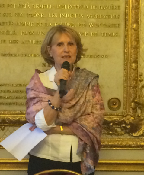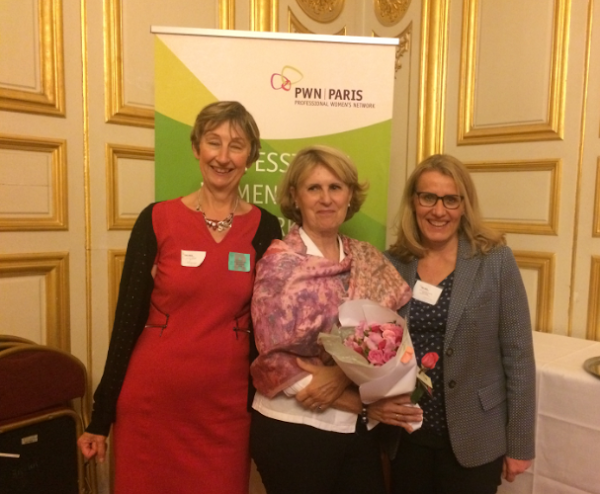Is timing a coincidence? Florence Beaugé, our special guest @Le Sénat restaurant

On April 24th, PWN Paris welcomed Florence Beaugé whose presence had a very special resonance after the first turn of the French presidential elections. Journalist and international reporter, specialized on international policy, Florence Beaugé spent 17 years at Le Monde.
In 2002, the choc of the duel Le Pen – Chirac at the second turn of the elections mobilized the country. The newspaper Le Monde then published a comprehensive file on Jean-Marie Le Pen with number of testimonies blaming his past actions, in particular through front page articles written by Florence Beaugé. She ended up with a resounding lawsuit for defamation she eventually won, years later, including in appeal and cassation. Testimonies and evidences were so overpowering that even the legendary eloquence of Mr Le Pen did not enable him to influence justice.
In 2000, Florence had already obtained the consent of General Aussaresses (this old general with the bandaged eye who was parading on TV saying he had neither remorse nor regrets) and the regrets of General Massu about the use of tortur e in Algeria. Thanks to her work at Le Monde, the return of memory on the Algerian War made it possible to consider these « events » as a War with the recognition of the atrocities perpetuated in this dark period of French history. She made a book out of this experience « Algeria a war without glory, Story of an investigation » published at Calman-Levy.
e in Algeria. Thanks to her work at Le Monde, the return of memory on the Algerian War made it possible to consider these « events » as a War with the recognition of the atrocities perpetuated in this dark period of French history. She made a book out of this experience « Algeria a war without glory, Story of an investigation » published at Calman-Levy.
In 2009, after spending 13 years as specialist of North Africa, she was expelled from Tunisia by Ben Ali because of her writings. While accompanying French Presidents in their trip to Maghreb, Florence alerted both Chirac and Sarkozy on the risk of supporting Ben Ali who was supporting extremists instead of fighting them. She had seen right since today Tunisia provides most of Daesh troups.
Florence Beaugé has an unusual career path in journalism. She began in television, at France 2, before spending 16 years in radio between Radio France Internationale and the international antenna of Radio Monte Carlo (RMC). She joined Le Monde in 2000 after working at Le Monde Diplomatique. She left the newspaper 18 months ago with regrets. Too many reporting and a degradation of the work environment with increasing pressure to produce more to the detriment of quality pushed her to make this choice.
She regrets the way journalism has evolved towards more production and less means to carry out in-depth investigations. Also, an accelerated feminization of the profession at the base is, according to Florence, a precursory sign of the massive disaffection of this job by men, as it was the case for teaching.
Being a woman journalist was rather an asset, especially in the Arab-Muslim world where she worked for many years. As a woman, she could have access both to men and women, which was not the case for a man. She had direct contact with women and mothers. Of course, she had many difficult experiences, notably in countries such as Algeria, but she never had to suffer from a lack of respect, all to the contrary. Florence does not function with the adrenalin of war or fear and never felt danger nor put herself in danger, including in countries at war, such as Lebanon. She recognises that it is more difficult today for young freelance journalists who have to endanger themselves to gain recognition.
On the other hand, being a woman journalist in France is more difficult since management positions are still massively held by men. Florence had a bitter and traumatic memory of the first time she went to see Edwy Plenel, Managing editor at Le Monde, to ask him to readjust her wages up to the level of her male colleague who was doing the exact same job. She was literally insulted and humiliated to the extent that she never again dared to ask for a raise during the rest of her carrier, even when she made Le Monde headlines with her article on Algeria and her lawsuit with Le Pen.
Today, Florence collaborates with Le Monde Diplomatique as an international reporter. With In 2016, she investigated the female condition especially in the United States and Iran (see her articles attached below).
With passion and a fascinating experience, Florence Beaugé generously shared her vision of journalism. Open and without pretense, she spoke of a changing profession and her passion for the field based reports.

Françoise Pelissier
member of PWN Paris Events team
Founder of Lettre en lien, expert in writing and pedagogy, she advices and trains companies and individuals in their project of evolution, change process and development.
Links to some articles written by Florence Beaugé: http://www.monde-diplomatique.fr/2016/11/BEAUGE/56765
https://www.monde-diplomatique.fr/2016/02/BEAUGE/54699
http://crise.blog.lemonde.fr/author/brics/
http://www.lemonde.fr/afrique/article/2012/03/16/le-grand-blond-au-poignard_1669337_3212.html
